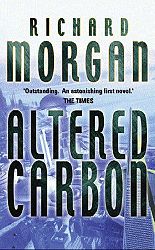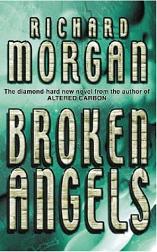
Altered Carbon
Richard Morgan
534 pages
published in 2002
Altered Carbon is Richard Morgan’s first novel. It made a strong impression, winning the Philip K. Dick Prize for best novel in 2003, as well as being optioned by Joel Silver, the sale of the movie rights enabling Morgan to become a fulltime writer. Since then Morgan has written several more novels, part of the same generation of British science fiction writers as Alastair Reynolds, Neal Asher and Jon Courtenay Grimwood. I knew of him, but had not read anything of his until last year, when I read Broken Angels and was sucked in from the first page. So not for the first time I started a series in the wrong way, as that was actually the sequel to this book — not that it mattered, as all they shared was the hero, Takeshi Kovacs.
Whereas Broken Angels was a Dirty Dozen type war romp with the cynicsm turned up to eleven, Altered Carbon is more of a Chandleresque film noir story. It starts with Takeshi as amercenary on Harlan’s World being caught and killed in a police dragnet, to wake up on Earth minus one partner and forced to solve the murder of Laurens Bancroft, which everybody but the murder victim in question thinks is suicide. If Takeshi refuses to cooperate or fails in his task he’ll go back in storage for the next couple of centuries or so.
